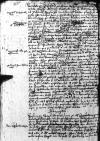Proficiscitur ad aulam regiam praesentium lator, spectabilis ⌊magistratus Elbingensis⌋ secretarius, qui ut dominos suos ad ⌊tribunal regium⌋ per concivem eorum ⌊Petrum Schissenteuber⌋ citatos purget, eo allegatus est. Causam ⌊homo⌋ importunus superiori anno in ⌊comitiis⌋ Graudentinis per dominos ⌊consiliarios⌋ decisam renovat, cum tamen eo tempore etiam admonitus , appellare noluerit, sed decretum dominorum ⌊consiliariorum⌋ in rem iudicatam transire permisit, nunc autem appellationem coram notario et testibus confingens, quam tamen nec dominis ⌊hic⌋ ⌊consiliariis⌋, nec parti advers[ae] insinuavit, eius praetextu citationem regiam, falsa facta relatione contra ⌊magistratum Elbingensem⌋, obtinuit.
Qua citatione si multum in faciendis expensis dictus ⌊magistratus⌋ molestia [is]tius ⌊hominis⌋ iniustissime gravetur, noluerunt tamen videri contumaces, sed o[b]temperandum esse citationi regiae duxerunt, quo autem citius absolverentur , petiverunt a me, ut eam causam ⌊reverendissimo domino Cracoviensi⌋ et Dominationi Vestrae, exponendo illis processum eius, commendarem. . Quod feci in ⌊⌋ mei[s] ad reverendissimum ⌊dominum Cracoviensem⌋ diligentissime, unde Dominatio Vestra et ex relatione dicti secretarii Elbingensis se melius informari poterit et statum caus[ae] cognoscere.
Quam plurimum rogo, cum idem etiam antea illae per patruelem meum, ⌊Ioannem Harteusky⌋, referri iussi, ne admi[t]tat, sed diligenter una cum reverendissimo ⌊domino Cracoviensi⌋ apud serenissimam ⌊maiestatem regiam⌋ instet, quo huiusmodi appellationes, quae per partes nullam aliam ob caus[am] coram notario et testibus fiunt, nisi ut non solvantur iudiciis sportulae appellationum, tollantur, nec posthac ulli concedantur, qui probare non potuerit appellationem ab ordinariis ⌊illi⌋ proh[i]bitam fuisse. Hoc si non cavebitur plurima inconveni[en]tia, quibus multum constitutionibus serenissimae ⌊maiestatis regiae⌋ et iudiciis hic [nos]tris derogabitur, inde nascentur.
Velit itaque Dominatio Vestra Elbinge[nsium] secretario non deesse patrocinio suo idque, ut in hac causa derogat[ur], extraordinariarum appellationum initium sumat et importu[ni] homines, qui nihil quam lites quaerunt, repellantur. In eo hic nobis non defuturam Dominationem Vestram mihi persuadeo.
Quam diutisime valer[e] cupio ex animo.
